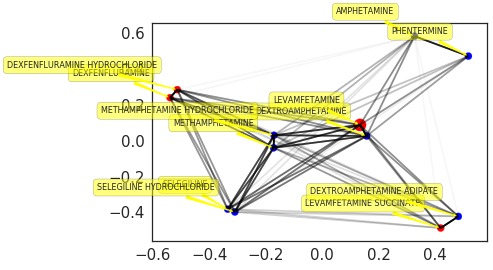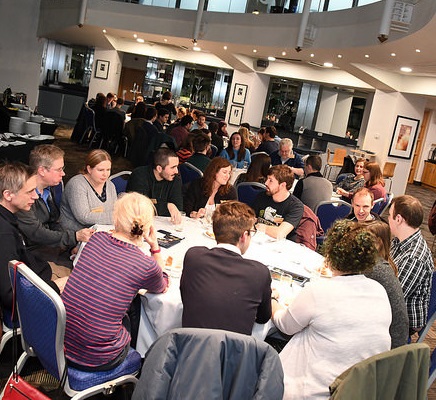Visiting Professor
Our congratulations go to Ilian Todorov for being awarded a Visiting Professorship at Queen Mary University of London (QMUL), School of Physics and Astronomy.
The award comes as the result of a long and successful collaboration between Ilian and QMUL's Dr Kostya Trachenko, which started with the Natural Environment Research Council's eMinerals project in 2002 and continues to this day. Ilian leads STFC's Computational Chemistry Group and provides support for CoSeC's collaborative computational project 5 (CCP5) and the High End Computational Materials Chemistry Consortium (HEC-MCC). He has led and helped develop the DL_POLY project, providing molecular dynamics simulation software and training which is also supported by CCP5, and which celebrated its 25th birthday in 2017.
Machine Learning course to help plug skills gap
To address a gap in skills highlighted by the UK Government's 'Made Smarter Review' published in October 2017, Chris Morris and Rebecca Mackenzie from our Computational Biology Group taught a practical course on “Machine Learning for Cheminformatics" at Daresbury Laboratory on 5th – 9th February. The review, which was industry-led, found that in the pharmaceutical industries the workforce is highly skilled in the areas of Synthetic Chemistry, Analytical Chemistry and Formulation Sciences but lacks the quantitative modelling skills required.
 This course covered the foundations of machine learning, applied specifically to industrial chemistry - so helping to get cutting-edge computing technology into industry to address industry problems. Topics included Decision trees, Naïve Bayes classification, Neural Networks, Support Vector Machines, Ensemble methods, and model validation. These were all taught using hands-on coding in Jupyter notebooks.
This course covered the foundations of machine learning, applied specifically to industrial chemistry - so helping to get cutting-edge computing technology into industry to address industry problems. Topics included Decision trees, Naïve Bayes classification, Neural Networks, Support Vector Machines, Ensemble methods, and model validation. These were all taught using hands-on coding in Jupyter notebooks.
Ardita Shkurti from SCD's Computational Chemistry Group gave an introduction to the Python programming language on the first day.
The course was well received, with several participants coming from industry and some from within STFC. Feedback included a comment that “when I was in need of some more clarity to get on with some of the topics, the directions you have given me have been entirely satisfying but also encouraging to get on ahead".
Chris said, “One thing I am particularly pleased about is that when we asked participants which of the methods they would use, the answers included nearly all of the course content."
He is planning to hold further workshops in the future, with the next one at STFC's Rutherford Appleton Laboratory (RAL) in Oxfordshire.
Support was given by Evgenia Alexandrova, Rob Allan, Laura Bennet, and Viliam Kalavsky, all based at the Daresbury Laboratory. The course development was funded by an ADDoPT programme grant from Innovate UK .
Data management and infrastructure panel debate
Brian Matthews, our Data Science and Technology group leader, was invited to participate in a panel discussion on 7 February at Pufendorf Institute for Advanced Studies at the University of Lund in Sweden, on the theme " Data management and infrastructure - from policy to practice". He joined a panel together with experts from the European Spallation Source and MAX-IV facilities, the Worldwide LHC Computing Grid, and the Swedish research funding body, for a lively three hour debate on the opportunities and challenges of research data. This was part of a 'Big Science & Society' project, exploring the changes resulting from data driven science and how a major research university such as Lund should respond to it.

HAP Workshop, Aachen University
Our Chief Data Scientist, Tony Hey, has been speaking this week at the Big Data Science in Astroparticle Research - HAP Workshop, at Aachen University in Berlin. Topics covered at this event included machine learning, open data-software-analysis, developments in national and international strategies, as well as hands-on tutorials in deep learning network architectures.
Numerical Analysis Day
Another successful event was the 16th annual Bath University/ RAL numerical analysis day, held at RAL on 22 January. Fifty people attended the full day of talks and presentations from a mix of both STFC and external speakers, which included Tim Davis from Texas A&M who was a postdoctoral fellow at RAL some years ago and has a continuing relationship with SCD's Computational Mathematics Group.
CCP4 Study Weekend
Almost 400 people attended the collaborative computational project CCP4 annual study weekend this year which, just to confuse us, ran from Wednesday 10th - Friday 12th January. The event was a great opportunity for crystallographers to shake off the post-New-Year torpor and get together with existing and potential new colleagues and collaborators during the three days of interactive knowledge exchange and networking sessions.
Speakers and participants came from as far afield as Taiwan, the USA and Japan as well as Europe and the UK for the event, which had a theme of 'Multi and Serial Crystal Data Collection and Processing'. Talks focused largely on the methodology being used and the latest knowledge coming from projects, and there was also a 'software fair' where CCP4 developers could demonstrate the latest software available. The majority of feedback from both participants and speakers gave either 'very good' or 'excellent' ratings for all aspects of the event, with one participant commenting,"I really like that it's an excellent opportunity for younger crystallographers like myself to learn a lot of new things, but it's also a great platform for more well-established crystallographers to keep up to date."
